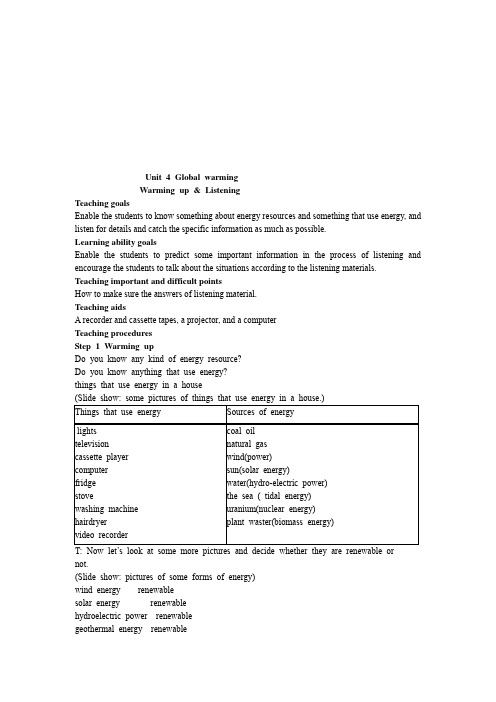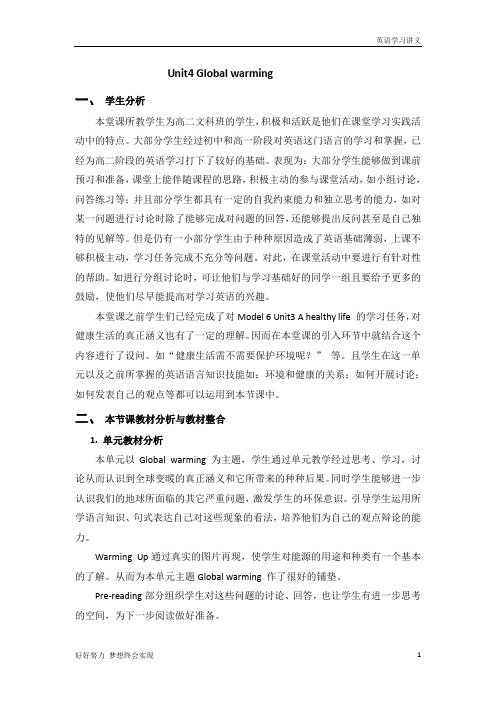人教版高中英语选修六Module6Unit4Learningaboutlanguage定稿
高二英语人教版选修6:Book6Unit4课堂练习含答案.doc

Part 1 Warming Up, Pre-reading, Reading and Comprehendingi.根据本单元所学单词及所给的提示,写出所缺单词的正确形式。
1.In order to survive, human beings need to _______ (消耗)food and water.2.The information is processed in a(n) ____ (任意白勺)order.3.Early warnings of rising water levels prevented another major _______ (大灾难).4.Johnson _______ (陈述)that he knew nothing about the case.5.The heavy rain has caused _______ (水灾)in many parts of the country.6.The population of the country is growing at a(n)____ (平稳的)rate per year.II.选用合适的短语,并用其适当形式填空。
1.a large quantity of, large quantities of, a large amount of, large amounts of① ______ money are spent on the subject.② ______ food was on the table, so please help yourself.air conditioners has been sold since the hot weather began.2.result in, result from①Job losses ________ c hanges in production.②The crash ________ t he deaths of 14 passengers.III.每空填一词,使上下两句话的意思相同或相近。
高中英语人教版选修六教案:Unit+4单元教案

Unit 4 Global warmingWarming up & ListeningTeaching goalsEnable the students to know something about energy resources and something that use energy, and listen for details and catch the specific information as much as possible.Learning ability goalsEnable the students to predict some important information in the process of listening and encourage the students to talk about the situations according to the listening materials.Teaching important and difficult pointsHow to make sure the answers of listening material.Teaching aidsA recorder and cassette tapes, a projector, and a computerTeaching proceduresStep 1 Warming upDo you know any kind of energy resource?Do you know anything that use energy?things that use energy in a house(Slide show: some pictures of things that use energy in a house.)Things that use energy Sources of energylights television cassette player computerfridgestovewashing machine hairdryervideo recorder coal oilnatural gaswind(power)sun(solar energy)water(hydro-electric power) the sea ( tidal energy) uranium(nuclear energy) plant waster(biomass energy)T: Now let’s look at some more pictures and decide whether they are renewable or not.(Slide show: pictures of some forms of energy)wind energy renewablesolar energy renewablehydroelectric power renewablegeothermal energy renewabletidal energy renewablebiomass energy renewablenuclear power plant, non-renewable (picture)an oil refinery(精炼厂), non-renewable (picture)coal power station, non-renewable (picture)natural gas non-renewable (picture)uranium Ore (铀矿石) non-renewable (picture)The element uranium does not occur in pure form in nature but is found in minerals such as carnotite(钒钾铀矿), pictured above. (picture)Conclusionnon-renewablecoal oil natural gas Uranium fossil fuelsrenewablewind (wind power) sun (solar energy) water (hydro-electric power)plant waste (biomass energy) hot springs or geysers (geothermal energy)the sea (tidal energy)Slide showWhat are fossil fuels?Ancient animal and plant material below the surface of the earth with a high carbon cont ent, such as coal, oil and natural gas, which can be burnt to produce energy.Also known as non-renewable energy because once they are used they have gone forever; they cannot be renewed.Step 2 Pre-listeningRead Exercise 1 together:1. Read the statements below and tick the ones you agree with.2. Listen to the tape and answer and decide which statement Professor Chen doesNOT agree with.1. We'll have to stop using fossil fuels.2. About 90% of the world's energy comes from fossil fuels.3. We can replace fossil fuels with renewable sources of energy.4. Nuclear power is a good source of energy.5. In the future, we'll need new technologies to replace fossil fuels.6. It's the developed countries who are to blame for producing most of the carbon dioxide.3. Listen again and tick the phrases that Professor Chen uses to agree or disagreewith Li Bin.Slide showExactly. I’m afraid I disagree with you.That’s true. I’m afraid not.That’s right. I don’t think so.That’s correct. No way.I agree. I don’t agree.4. Listen for the third time and fill in the blanks.1.Our modern _________ societies depend on the energy we get from_________.2.It’s a very ____________ and cheap form of energy.3.Can’t we just ________ fossil fuels with ________ sources of energy like sun or wind power?4.However, whatever we do, we have to do it as a ________________.5.The _________ countries are really the ones to ______.Keys:1.industrial; fossil fuels 2. concentrated 3。
最新人教版高中英语选修六Unit4 Using language

Earth Care’s Can you Reasons suggestions carry it out? Turn electrical appliances off when not using them. Don’t turn up the heat. Put on more clothes. Walk or ride a bike. Don’t drive. Recycle cans, bottles, plastic bags and newspapers.
人教课标 高二 选修 6 Unit 4
1. To read Quyang Guang’ email and Earth Care’s reply. 2. To develop students’ sense of environmental protection. 3. To learn some useful words, expressions and patterns in the passage.
Skim the letters and find who the
writers are and what their
purpose of writing the letters is.
The first letter is written by a student who is asking for suggestions for his project — ______________. global warming The second letter is written by an editor of Earth Care magazine. ______________________ He offers the student some suggestions on what to do about global warming.
人教版高中英语选修六:Unit4教案+

Unit4 Global warming一、学生分析本堂课所教学生为高二文科班的学生,积极和活跃是他们在课堂学习实践活动中的特点。
大部分学生经过初中和高一阶段对英语这门语言的学习和掌握,已经为高二阶段的英语学习打下了较好的基础。
表现为:大部分学生能够做到课前预习和准备,课堂上能伴随课程的思路,积极主动的参与课堂活动,如小组讨论,问答练习等;并且部分学生都具有一定的自我约束能力和独立思考的能力,如对某一问题进行讨论时除了能够完成对问题的回答,还能够提出反问甚至是自己独特的见解等。
但是仍有一小部分学生由于种种原因造成了英语基础薄弱,上课不够积极主动,学习任务完成不充分等问题。
对此,在课堂活动中要进行有针对性的帮助。
如进行分组讨论时,可让他们与学习基础好的同学一组且要给予更多的鼓励,使他们尽早能提高对学习英语的兴趣。
本堂课之前学生们已经完成了对Model 6 Unit3 A healthy life 的学习任务,对健康生活的真正涵义也有了一定的理解。
因而在本堂课的引入环节中就结合这个内容进行了设问。
如“健康生活需不需要保护环境呢?”等。
且学生在这一单元以及之前所掌握的英语语言知识技能如:环境和健康的关系;如何开展讨论;如何发表自己的观点等都可以运用到本节课中。
二、本节课教材分析与教材整合1. 单元教材分析本单元以Global warming 为主题,学生通过单元教学经过思考、学习,讨论从而认识到全球变暖的真正涵义和它所带来的种种后果。
同时学生能够进一步认识我们的地球所面临的其它严重问题,激发学生的环保意识。
引导学生运用所学语言知识、句式表达自己对这些现象的看法,培养他们为自己的观点辩论的能力。
Warming Up通过真实的图片再现,使学生对能源的用途和种类有一个基本的了解。
从而为本单元主题Global warming 作了很好的铺垫。
Pre-reading部分组织学生对这些问题的讨论、回答,也让学生有进一步思考的空间,为下一步阅读做好准备。
人教版高中英语选修六book6unit4reading(共40张PPT)

人教版高中英语选修六book6unit4rea ding( 共40 张PPT)
Thinking:
Which source is cleaner or
healthier?
√√
√√
Coal oil wind sun nuclear water underground
√√
heat
√√
Which source is “renewable”?
人教版高中英语选修六book6unit4rea ding( 共40 张PPT)
hydro-electric dams
Water are kept back and raised its level for irrigation or for producing electricity.
人教版高中英语选修六book6unit4rea ding( 共40 张PPT)
solar panels
pieces of equipment on a roof that collects energy from sunlight in order to heat water and produce electricity
人教版高中英语选修六book6unit4rea ding( 共40 张PPT)
coal power stations Electricity is produced by burning coals.
人教版高中英语选修六book6unit4rea ding( 共40 张PPT)
Oil is refined and made pure.
oil refineries
人教版高中英语选修六book6unit4rea ding( 共40 张PPT)
人教版选修6高二英语模块六第四单元project和答案

1、empty:空的,里面没有东西,更没人住
vacant:里面有东西,但没人(住……)无人占据
Since the hotel is quite near the beach, there are very few rooms _________all the time.
【合作探究】
Listen to and read the article, looking for the information required in the chart.
Name
The Medecins San Frontieres (MSF)
Purpose
Present
situation
What they
1、(n.)承诺;奉承→(v.)承诺;投入;犯(错误)
2、(adj.)不可用的→(反义词)可用的
3、(adj.)空缺的→(n..)空缺;空处
4、(adj.)临时的→(adv.)临时地
5、(adj.)不严峻的;次要的→(反义词)严峻的;要紧的
6、(n.&vt.)安慰→(adj.)给人安慰的;舒服的
短语
翻译:
______________________________________________________________.
3.So the situation is completely defferent here, as are the problems.
分析:
______________________________________________________________.
Learning procedures(学习过程):
人教新课标选修六Unit 4Learning about language

father did the experiment yesterday
evening. e.g. It was in that city that we met for the first time. It was not until he told me that I knew the truth.
Possible meanings
Word
Which used
1. n. a general tendency in the way a situation is trend changing 2. v. to start doing something that everyone copies
1
Possible meanings 1. v. to make something (especially something bad) increase 2. n. a substance that can be burned to make heat or energy
Word Which used
2. Although we are burning coal in huge
_________ every year, we won’t quantities ________ of it for centuries. run out 3. If the amount of greenhouse gases
6. On the whole the warming of the
earth is a ____________ that causes phenomenon great concern. graph 7. The _______ shows temperature changes during the 20th century. 8. One hectare of forest can absorb 23 tons of carbon dioxide ____ year. per
人教新目标高中英语选修六课件Unit4LearningaboutLanguage

It+seems (appears)+that (subject +v.) happens
① It is very important to help each other. 相互帮助非常重要。 ② It is no use / useless going there again. 再去那里是没有用的。
Unit 4 Global warming
Learning about Language
Learning aims
1. Check up the answers of the exercises on P28. 2. Learn the use of “it” — “it” is used for emphasis in a sentence.
2. 引导词 (1)作形式主语, 代替由不定式, 动名词或从句表示 的真正主语。其基本句型为: It (形式主语) +adj. + to+ v. It (形式主语) +adj. + that (subject (主语)+v. ) It (形式主语)+adj.+ whether (subject +v.)
二、it用于强调句 用在强调句型中, 为了强调句子的某一成分(通常是主 语、宾语或状语), 常用结构: It is / was +被强调部分+that (who) …. 注意: 此结构强调的成分仅限于主语、宾语和状语。
例如: 原句:My father did the experiment in the lab yesterday evening. 强调主语: It was my father who/that did the experiment in the lab yesterday evening. 强调宾语: It was the experiment that my father did in the lab yesterday evening.
